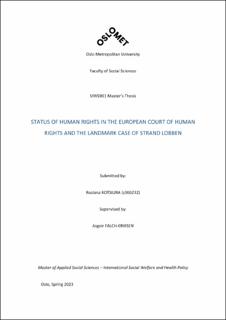Status of Human Rights in the European Court of Human Rights and the Landmark Case of Strand Lobben
Abstract
In Norway, the right to respect for family life is a crucial topic in both social and legal discussions. This is especially true following the European Court of Human Rights rulings against the Norwegian Child Protection Services from 2019 to 2023. Therefore, the decision made in the Stand Lobben case is essential as it upholds guiding principles for safeguarding the right to respect for family life.
Strand Lobben's conflicting opinions make it an interesting subject of study for social researchers. In addition to the court's main arguments, the ruling includes supporting and opposing views and numerous amicus briefs on how to interpret human rights. This raises the issue of whether the courts can make a coherent decision and whether there is a shared understanding of the purpose of human rights.
The fundamental tenets of human rights theory and cosmopolitan logic stipulate that human rights are universal, inalienable, interrelated, interdependent, and indivisible. This implies that every individual is endowed with equal dignity and rights, and comes from international agreements, such as the Universal Declaration of Human Rights, the Convention on the Rights of the Child, and the European Convention on Human Rights, provide a standard framework for human rights, which guarantees the right to respect for family life. Cosmopolitan rationale aims to safeguard the dignity of all members of society by making decisions based on human rights across jurisdictions and without state control, irrespective of political considerations.
The ruling by Strand Lobben highlights the dominant perspectives of communitarian and instrumental approaches. Therefore, Article 8 of the European Convention on Human Rights appears to not align with the cosmopolitan rationale. Unfortunately, the arguments presented in the decision are incoherent and lack legal certainty, leaving room for ambiguous interpretations and political influence.
